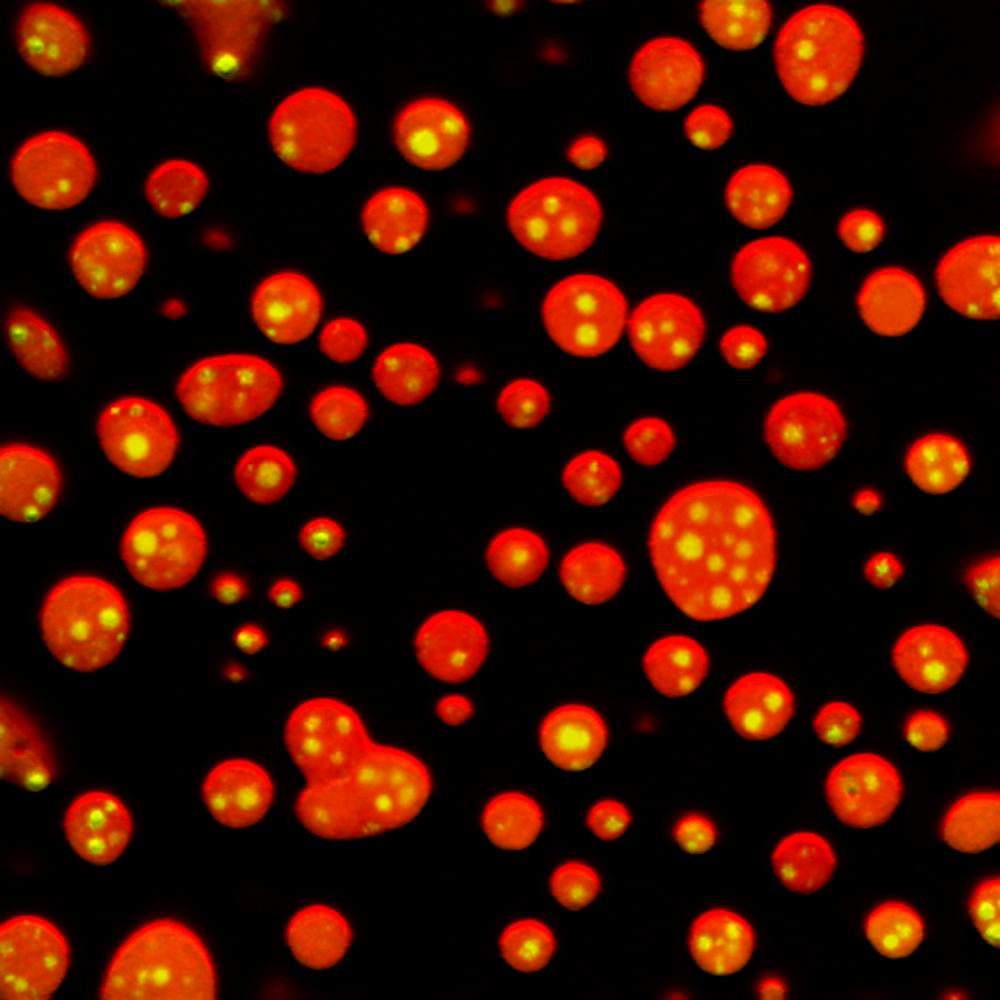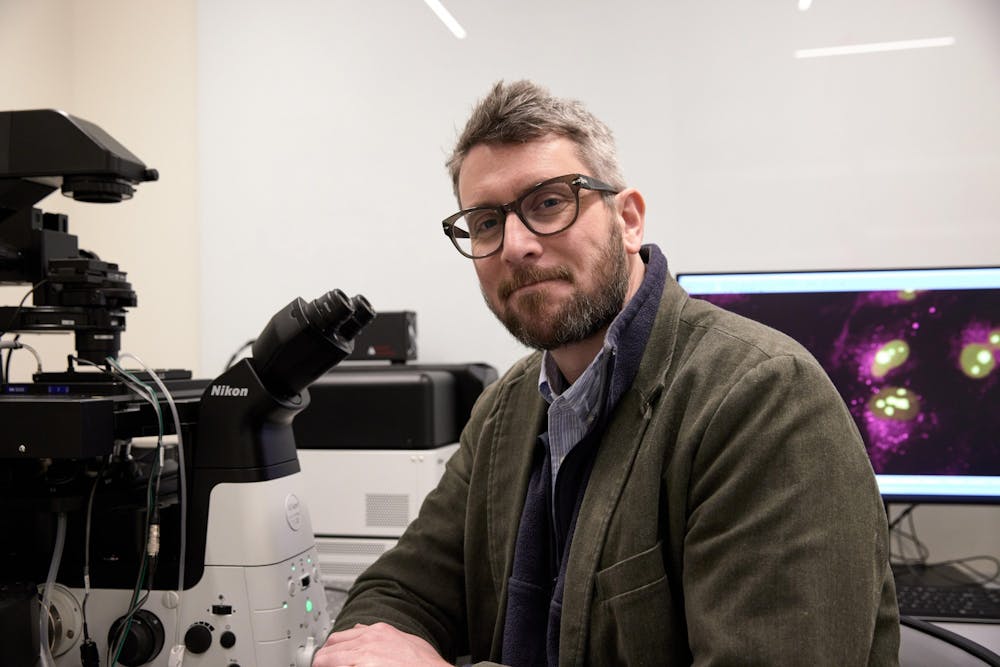Princeton scientist Clifford P. Brangwynne, the June K. Wu ’92 Professor of Chemical and Biological Engineering, was awarded the 2023 Breakthrough Prize in Life Sciences, one of the highest honors awarded to scientists conducting groundbreaking research in the biological sciences.
The $3 million award will be shared by Brangwynne and Anthony Hyman of the Max Planck Institute of Molecular Cell Biology and Genetics in Dresden, Germany, for “discovering a fundamental mechanism of cellular organization mediated by phase separation of proteins and RNA into membraneless liquid droplets,” according to the announcement.
The prize was also awarded to Demis Hassabis and John Jumper of DeepMind, as well as Emmanuel Mignot of Stanford University School of Medicine and Masashi Yanagisawa of the University of Tsukuba.
Biologists have long understood cells to be organized into membrane-bound organelles like the mitochondria and Golgi apparatus. These organelles compartmentalize the functions carried out by the millions of cells in living organisms.
Brangwynne and Hyman’s research highlighted the previously unknown importance of condensates, which are membrane-less objects spontaneously formed by molecular forces in the cytoplasm. The discovery of condensates has radically altered scientists’ understanding of cell biology.
The discovery can be traced back to 2008, when Brangwynne and Hyman taught a famous physiology course at the Marine Biological Laboratory (MBL) in Woods Hole, Mass.
When the two scientists observed the fusion and splitting of droplets of RNA aggregates in fertilized worm eggs, Brangwynne and Hyman hypothesized that the formations of these droplets, or “P granules,” were caused by phase separation — the same physical process that turns oil in water into many droplets.
Hyman and Brangwynne published their hypothesis in Science in 2009. Although the paper received little attention for a few years, their insights have since spawned a novel and vibrant field of research.
In an interview with The Daily Princetonian, Brangwynne reflected on the trajectory of the field and life sciences at large.
“We spent a lot of time discovering, identifying, and cataloging the trees. And in that process, I sometimes think that we forgot to ask about the structure of the forest,” Brangwynne said. “That’s one of the really exciting and potentially long-lasting impacts of [our] discovery. It’s really catalyzed this kind of integrative thinking.”
David W. Sanders, a postdoctoral researcher in Brangwynne’s group, described the group’s highly quantitative approach to studying biology.
“[Brangwynne] is just a very careful, methodical, and quantitative researcher who has pushed the field forward from its early days to the point where it’s become almost textbook canon today,” Sanders said in an interview with the ‘Prince.’ “If we understand the quantitative principles that really explain how these things form, then we’re going to understand a lot more about how [neurodegenerative] disease starts and about how we can treat it.”

Biomolecular condensates play an integral role in understanding cell biology, and they are understood to play key roles in such processes as cell division and gene regulation. If researchers can understand and manipulate these processes, they may be able to create real clinical applications in treating neurodegenerative diseases such as amyotrophic lateral sclerosis.
Raised in Boston, Brangwynne graduated from Carnegie Mellon University with a B.S. in materials science and engineering in 2001.
Brangwynne recalls spending a year of absence from his undergraduate studies working in the laboratory of Harvard cell biologist Donald Ingber. He credits his time at that lab for helping him make the insights that linked material science together with biology.
He received his Ph.D. in applied physics in 2007 after conducting research under David Weitz at Harvard University. After completing his Ph.D., Brangwynne went to the Max Planck Institute, where he worked as a postdoctoral researcher under Hyman.
In the summer of 2008, the two taught a well-known physiology course at the MBL, where they studied the growth of the embryos of C. elegans roundworms and made their groundbreaking hypothesis.

Condensates of purified proteins in phase droplets, the focus of Brangwynne’s work.
Courtesy of Cliff Brangwynne
Brangwynne became an assistant professor of chemical and biological engineering at Princeton in 2011. He was named the June K. Wu ’92 Professor of Chemical and Biological Engineering in 2020.
Ned S. Wingreen, the Howard A. Prior Professor in the Life Sciences and a frequent collaborator with Brangwynne, recalled the latter’s role in creating a community of scientists doing research on condensates in the field’s early days.
“I think, from very early on, he had the sense that this was going to be primetime,” Wingreen said in an interview with the ‘Prince.’ “Now, it’s just overwhelming. So many people on campus have discovered that their systems undergo phase separation, and that’s playing an important role in the biological function they’re studying.”
Wingreen and Brangwynne both attributed much of the field’s early successes to a 2015 meeting held at the Princeton Center for Theoretical Science, which the two organized with Professor of Mechanical and Aerospace Engineering Mikko Haataja.
Brangwynne is also the director of the Princeton Bioengineering Initiative and an investigator with the Howard Hughes Medical Institute. He recently co-founded Nereid Therapeutics, a company that seeks to develop treatment methods on the basis of research done in his Princeton laboratory.
The Breakthrough Prizes in Life Sciences was founded in 2012 by Sergey Brin, Priscilla Chan and Mark Zuckerberg, Yuri and Julia Milner, and Anne Wojcicki. It is awarded each year alongside the Breakthrough Prize in Mathematics and the Breakthrough Prize in Fundamental Physics.
Each prize includes a monetary award of $3 million, making them the largest financial science prizes in the world.
Allan Shen is a senior writer who often covers research and obituaries. He can be reached at fuluns@princeton.edu, or on Twitter at @fulunallanshen. He previously served as an Associate News Editor.
Jess Choe is a news contributor for the ‘Prince.’ She can be reached on Instagram @jess_theta09 or jc8138@princeton.edu.








